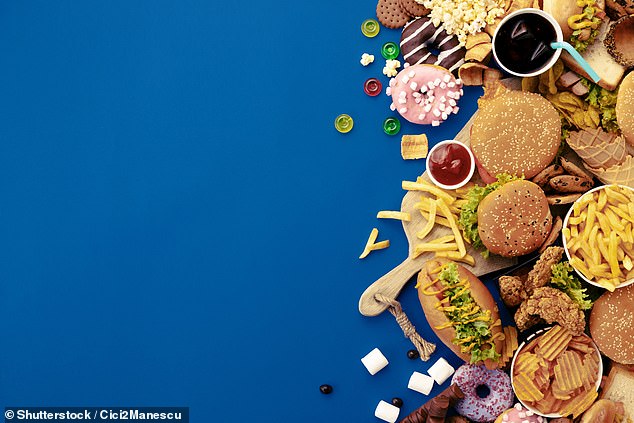Ultra-processed foods should be banned from schools and hospitals to avoid ‘pushing aside’ healthier alternatives, according to a leading researcher
Ultra-processed foods should be banned from schools and hospitals to prevent them ‘pushing aside’ more nutritious alternatives, according to a leading researcher.
Professor Carlos Monteiro, whose work led to the Nova classification of food groups, said UPFs should be heavily taxed, with revenues used to subsidize fresh produce.
He also urged officials to recognize their role in worsening diseases and treat these “addictive” and harmful foods the same as tobacco.
Speaking today at the International Congress on Obesity in Sao Paulo, Brazil, he will call for banning or severely limiting advertising for UPFs, and for the products to be heavily taxed.
He will suggest that reformulating foods – for example by reducing sugar and salt – does not go far enough, because the way they are made makes them dangerous.
Highly processed foods should be banned in schools and hospitals and heavily taxed from revenues used to subsidize fresh produce, Professor Carlos Monteiro has said.
While presenting research, he will say, “Both tobacco and UPFs cause numerous serious illnesses and premature deaths; both are produced by transnational corporations that invest the enormous profits they make from their attractive and addictive products in aggressive marketing strategies and anti-regulation lobbying; and both are pathogenic (dangerous) in nature, so reformulating is not a solution.”
Britain is the worst country in Europe when it comes to eating ultra-processed foods; it makes up 57 percent of the national diet.
These foods, including breakfast cereals, mass-produced bread, convenience foods and ice cream, tend to be higher in fat, saturated fat and sugar, while lower in fiber, protein and micronutrients.
Previous research has shown that people who eat the most mass-produced foods are up to a quarter more likely to have a heart attack or stroke.
Even foods marketed as “healthy” options – such as fruit or protein bars and low-fat yogurt – are likely to be harmful to health, studies have shown.
Professor Monteiro called for public health campaigns and said it is time for governments to take action and protect the most vulnerable.
He will say, “The sale of UPFs in schools and healthcare facilities should be banned, and there should be a heavy tax on UPFs, with the revenue generated used to subsidize fresh food.” However, others stated that comparing UPFs to tobacco or cigarettes is too “simplistic.”
While tobacco is inherently bad, the dangers of UPFs are debated, with certain levels of processing useful and often necessary.
Dr. Hilda Mulrooney, lecturer in nutrition and health at London Metropolitan University, said taxes on sugar-sweetened drinks in Britain have proven successful in encouraging reformulation and changes in consumer behavior, much more so than voluntary guidance to reduce sugar content, for example. contents of infant food.

Research has shown that even foods marketed as “healthy” options – such as fruit or protein bars and low-fat yogurt – are likely to be harmful to health.
She said: ‘Treating food like tobacco is very simplistic. There is no such thing as a safe cigarette, not even second-hand, so banning them is relatively easy because the health issue is very clear.
‘However, we need a range of nutrients, including fat, sugar and salt, and they have multiple functions in foods – structural, shelf life – and not just taste and flavor and hedonic properties.
“It’s not as easy to reformulate some foods to reduce them, and they’re not the same as tobacco, because we need food — just not in the amounts most of us consume.”
Gunter Kuhnle, professor of nutrition and food sciences at the University of Reading, said: ‘The amount of data we have from scientific evidence does not support some of the claims – that ultra-processed food causes poor health.’
He said focusing on processing levels could distract from the issues that make it harder to find solutions to tackle diet-related health problems.
He added: ‘Some ultra-processed foods are high in sugar, fat or salt and are known to have a negative effect on health, while others can be an important source of fibre, whole grains or fish.
‘There is currently no scientific model that supports the claim that they all have a negative effect on health.’
